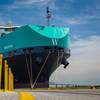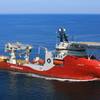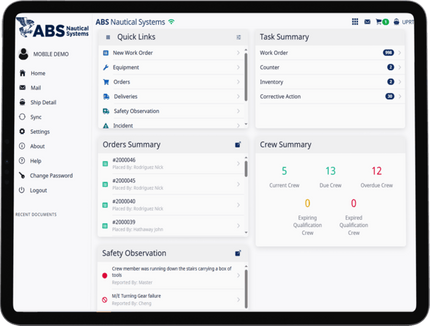Wärtsilä Wins Total Solution Order for LNG Vessel
Wärtsilä, the marine industry's leading solutions provider, has been contracted by Kleven Maritime of Norway to design a new LNG powered Platform Supply Vessel (PSV) of the Norwegian operator Rem Offshore. The scope of the order also includes the propulsion machinery, automation and other equipment for the same vessel.
Wärtsilä is the clear market leader in supplying design and propulsion solutions for LNG powered PSVs, a position that is further strengthened with this order. Furthermore, this comprehensive scope of supply emphasises Wärtsilä's strong position as a total solutions provider and a system integrator with the capability to offer marine customers a single-source of supply for all their needs. This simplifies and speeds the design and ship building process and reduces the risk of delays.
Rem Offshore's new LNG powered PSV, the first such vessel for its fleet, will be a Wärtsilä Ship Design VS499 LNG PSV, a state-of-the-art vessel based originally on the successful VS489 LNG PSV design. The ship features outstanding energy efficiency, a unique hull form, fuel flexibility, and exceptional performance in areas such as fuel economy and cargo capacity.
In addition to the complete design of the vessel, Wärtsilä's scope of supply for the new PSV includes the dual-fuel main engines and generating sets, the electrical power and propulsion systems, integrated automation, and the power management system. The selection of Wärtsilä's dual-fuel (DF) technology, which enables the use of clean gas as the main fuel, is in line with Rem Offshore's ambition to grow its fleet in environmentally sustainable PSVs. The DF engines can also operate on marine diesel oil if required. The vessel is to be built at the Kleven Verft yard in Norway.
Wärtsilä at the forefront in environmental vessel solutions
This order represents the third new contract for LNG powered PSV within a short period of time that Wärtsilä will design and equip. Wärtsilä's ability to offer total concept solutions that include the design of the vessel, the propulsion plant, electrics and automation, and a host of fuel saving and environmentally sustainable options, has given the company a notable competitive edge, particularly in the area of specialty vessels such as Gas PSVs.
This Rem Offshore new-build order is further evidence of the growing global demand for Wärtsilä's unique gas electric propulsion system configuration. This is based on a combination comprising the Low Loss Concept for Electric Propulsion, the Wärtsilä 34DF main engines, and the recently introduced Wärtsilä 20DF engine.
"The unique combination of our design capabilities and technology strengths enables us to provide a 'big picture' perspective that has real value, particularly in special vessels such as this one," commented Tor Henning Vestbøstad, Sales Manager, Wärtsilä Ship Design.
"The integrated solution, utilizing Wärtsilä's dual-fuel engines and Low Loss Concept, means that the customer will have the highest possible redundancy and reliability - and a highly efficient vessel, for operation in all conditions. The energy efficiency, cargo capacity and overall performance are all outstanding," he adds. Vestböstad also emphasises the company's excellent collaboration with both Rem Offshore and Kleven, which has been an important factor in the success of this project.
A unique combination of design, technology and integrated solutions
The Wärtsilä 20DF engine is the latest addition to the company's complete portfolio of dual-fuel engines. This industry leading technology offers the marine sector numerous benefits, including the primary advantage of having the flexibility to utilize different fuels. At a time of uncertainty in the cost of liquid fuels, and as environmental legislation becomes increasingly stringent, this flexibility enables the use of cost-efficient and environmentally friendly LNG as the main fuel. In case of interruption to the gas supply, Wärtsilä DF engines automatically switch to diesel mode operation without any loss in speed or power output. Single fuel installations obviously lack this additional level of operational safety.
Source: www.wartsila.com













